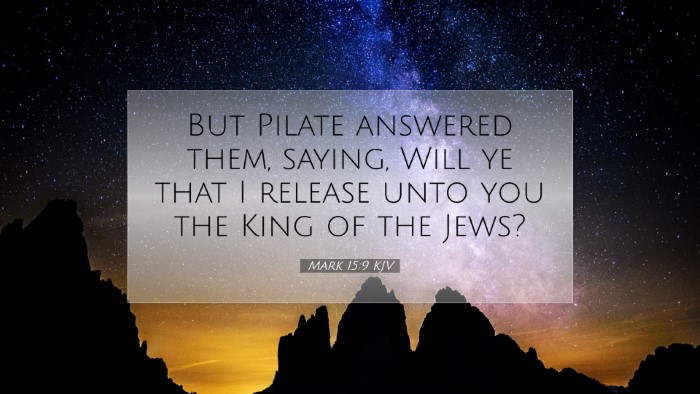Commentary on Mark 15:9
Text of Mark 15:9: "But Pilate answered them, saying, 'Do you want me to release to you the King of the Jews?'
Introduction
Mark 15:9 serves as a profound intersection of political power and spiritual truth, where the Roman governor Pilate offers to release Jesus, whom he refers to as the King of the Jews. This moment reflects a multitude of theological implications and historical contexts, which will be explored through the insights of respected commentators.
Context of the Passage
This verse occurs during the trial of Jesus before Pilate, highlighting the struggle between earthly authority and divine kingship. Pilate, representing Roman authority, is tasked with assessing the charges against Jesus, who has been condemned by the Jewish leaders. The appeal to release Jesus demonstrates the complexities of Pilate's position and the Jewish leaders' manipulation of public sentiment.
Commentary Insights
1. Matthew Henry's Perspective
Matthew Henry emphasizes the moral lessons found in this passage. He notes that Pilate's question, “Do you want me to release to you the King of the Jews?” reveals his awareness of Christ's innocence. Henry argues that Pilate's offer to the crowd underscores their collective rejection of Christ, thus highlighting the tragic nature of humanity in its rebellion against divine truth.
2. Albert Barnes' Remarks
Albert Barnes provides a detailed examination of Pilate's role as a reluctant participant in this trial. He suggests that by framing Jesus as “the King of the Jews,” Pilate inadvertently acknowledges Jesus' rightful claim to lordship, which is a pressing confrontation against the geopolitical dynamics of the time. Barnes points to the irony that while the crowds were given the choice to free Jesus, they instead choose Barabbas, illustrating the depths of human depravity and the rejection of the Messiah.
3. Adam Clarke's Analysis
Adam Clarke concerns himself with the social and political conditions during Jesus' trial. He notes that Pilate was keenly aware of the dangers posed by the Jewish leaders, and thus, his questioning serves to deflect responsibility. Clarke highlights that Pilate's proclamation of Jesus as “the King of the Jews” was both a moment of truth and tragedy, encapsulating the struggle between earthly and heavenly authority. He further posits that this moment fulfills prophecy and reveals God’s sovereign plan in Jesus’ sacrificial mission.
Theological Implications
- Christ’s Kingship: This passage invites reflection on the nature of Christ’s kingship. While Pilate addresses Him mockingly, those who understand His identity recognize a more profound reality: Jesus is indeed King, not in a temporal sense, but as Sovereign of the universe.
- Human Rejection: The cry for Barabbas over Jesus serves as a stark reminder of the human tendency to reject spiritual truth for worldly desires. The implications of this choice resonate throughout history, challenging believers to examine their priorities and allegiances.
- Political Pressure: Pilate’s actions can be seen as indicative of the pressures faced by leaders when confronted with religious and ethical dilemmas. His desire to placate the crowd reveals the tension between justice and public opinion.
Applications for Today
As ministers, students, and theologians reflect upon Mark 15:9, several applications emerge:
- Awareness of Authority: Believers are reminded of the ultimate authority of Christ, inspiring them to acknowledge His lordship in personal and community aspects of life.
- Understanding Rejection: The passage encourages believers to be prepared for rejection in their witness for Christ, as the crowd chose Barabbas over their King.
- Confronting Political Powers: This text invites relevant discussions around the role of Christians in engaging with political authorities, reminding them of the need to stand for truth amidst societal pressures.
Conclusion
Mark 15:9 encapsulates a pivotal moment in the Passion narrative, rich with theological significance and historical context. Through the insights of Matthew Henry, Albert Barnes, and Adam Clarke, we gain a deeper understanding of the complexities surrounding Pilate’s question and its implications. As we contemplate Jesus being offered to the people, we are challenged to reflect on our own responses to His kingship and the truths of the Gospel.


